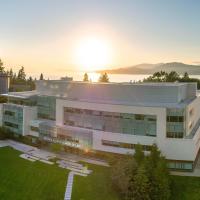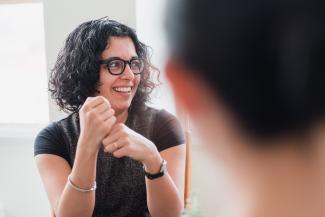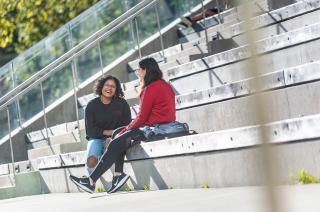Rise Women’s Legal Centre lawyer Vandana Sood on her path to a career in social justice

Allard Law
Aug 8, 2023

Vandana Sood found herself drawn to law after working over a decade in the sciences. “I was always interested in being of service to others, in particular helping with matters related to women and social justice,” explains Sood. “That’s why I decided to apply to law school.”
Since graduating from the Peter A. Allard School of Law in 2010, Sood has practiced in areas including Aboriginal, criminal and family law. And since 2016, she’s served as the supervising lawyer of the Student Legal Clinic at Rise Women’s Legal Centre – a legal non-profit organization serving women and gender-diverse people in BC. She’s also an adjunct professor at Allard Law, teaching the clinical and the seminar components of the Student Legal Clinic’s experiential learning program.
At Rise, second- and third-year Allard Law students have the opportunity to gain hands-on legal experience, primarily focusing on family law. This can include conducting client interviews and intake, providing legal advice, negotiations, and in some cases, full representation in court.
We spoke with Sood about her experience at Rise and asked her to share some advice for students and practitioners who might be interested in a public interest and social justice focused legal practice.
How did you find yourself at Rise?
I started law school with an interest in immigration law. But within weeks of starting law school, I went to court for a criminal file through the Law Students' Legal Advice Program and became very interested in the area. I went on to article with a senior criminal defense lawyer, but the idea of starting my own criminal law practice was daunting straight out of articles. I was also interested in Aboriginal law so I practiced at an Aboriginal law firm for a few years before starting my own practice focusing eventually on family law.
Starting my practice allowed me to build relationships in the women’s and anti-violence community, which is how I learned about my current position at Rise.
What kind of work do you do at Rise?
Our clients are women and gender-diverse people who don’t qualify for legal aid but cannot afford a private lawyer either. We assist those clients with mainly family law issues, including parenting, child support and family violence – an issue which comes up in more than half of our cases. We’ve found that when a client has a family legal issue that cannot be resolved without the help of a lawyer, there is often some sort of power imbalance or violence at play that needs to be addressed.
As lawyers, we sometimes think in silos and only focus on our legal community, but we and our clients are members of many other communities as well. Rise operates in many overlapping communities as a non-profit legal organization, but also as an anti-violence organization serving women and gender-diverse folks that is situated in the Downtown Eastside. Being part of this broad network means that we have connections and can give our clients referrals for non-legal support as well.
What do students learn while working at the Student Legal Clinic at Rise?
Rise allows students to experience what it’s like to be a lawyer with a litigation practice in family law and how to manage relationships with clients, all within a supportive teaching environment. We don’t expect students to know any of this when they begin the program, and they get to learn it through the course of the semester where they experience getting the fact pattern from the client, figuring out what the issues are, and applying the law. This is a big change from understanding the application of law in an exam, and allows students to gain valuable skills which are transferable to any area of law, and gives them a better idea of what they may or may not be interested in later on.
We also have a wonderful community of Rise student alumni. We are available to mentor our students even after they leave Rise. We’re here if they want to reach out, and it’s come full circle as we have had Rise alumni returning to teach our new students about their experiences in the legal field.
What advice do you have for new grads and current students who are thinking about a public interest and social justice focused practice?
Public interest and social justice legal work can include direct services to clients. Our wonderful legal non-profit community is working on changing laws that are problematic and negatively impacting their client population, but in the meantime, those people need help today. Once you are practicing, you can represent your clients with compassion and courage, and advance the best arguments you can under the law.
Another impactful way you can take part in social justice is to take on legal aid, low bono or pro bono cases as a practicing lawyer. There is a shortage of lawyers taking on legal aid referrals, and there are so many self-represented people trying to navigate the justice system on their own. See if you can devote a proportion of your practice to some of these cases.
Do you have any tips for practicing self-care in a demanding career?
Self-care can be challenging in our profession. Legal work is demanding and lawyers often work long hours. Do what you can with work-life balance in wherever you are working in law, and see if you can push the profession to build in more mechanisms to make work-life balance more acceptable. If young people coming into the profession continue to demand better work-life balance, things could slowly start to change.
- Allard School of Law
- Alumni & External Relations


